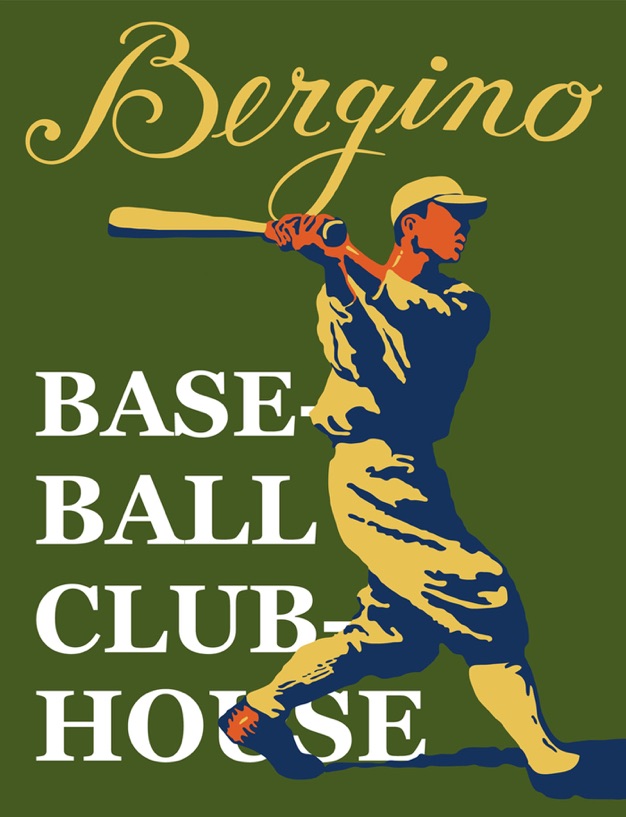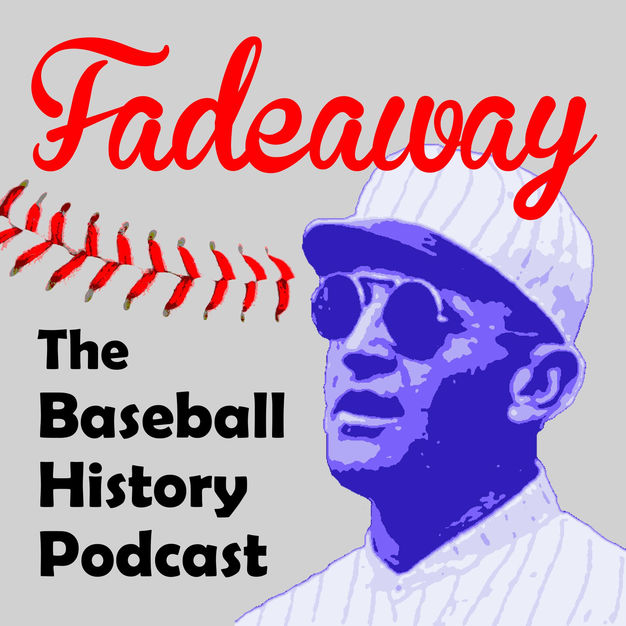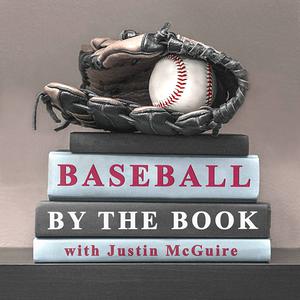
Bergino Baseball Clubhouse
Bergino Baseball Clubhouse
Listen in to our podcasts, live from the Bergino Baseball Clubhouse. Featuring premier authors, Pulitzer Prize-winners, team owners, Hall of Famers, and the most interesting folks in baseball.
- 43 minutes 27 secondsA Conversation with Watercolor Artist James Fiorentino
A special presentation from the Bergino Baseball Clubhouse. Our first podcast during these pandemic times…
In the Fall of 2017, the now shuttered brick-and-mortar location of the Bergino Baseball Clubhouse hosted “Baseball in Black and White: The Watercolor Paintings of James Fiorentino.”
In the Fall of 2021, the Studio 7 Fine Art Gallery in Bernardsville NJ hosted James Fiorentino and “Baseball in Black and White: Extra Innings.”
I sat down at the beautiful Studio 7 gallery with my long-time friend and we had a wide ranging “inside baseball” discussion that touched on memories through the years, the life — and gifts — of an artist, mentors, watercolor painting, ballplayers, the cake boss, passion, process, the feeling when a painting is finished, and more.
On Friday, December 10, we’ll be back at the Studio 7 Fine Art Gallery in Bernardsville NJ. If you’re anywhere close to the area, stop by between 6:00 - 9:00 PM. Meet James and see his spectacular original black and white watercolor paintings, while enjoying treats and a glass of wine. I’ll be conducting in-person video interviews for my multimedia project — “The Memory of America: Remember Your First Baseball Game.” The interviews take only 15 minutes or so. Would love to capture your story that evening.
Hope to see you then. In the meantime, pull up a chair, relax, and enjoy our conversation…
With love from New York,
Jay
22 November 2021, 6:12 pm - 1 hour 42 seconds"San Francisco Year Zero" with Lincoln Mitchell
San Francisco Year Zero: Political Upheaval, Punk Rock, and a Third-Place Baseball Team with Lincoln Mitchell
Special Roundtable Guests: Jennifer Blowdryer and Kenneth Sherrill
A wide-ranging conversation touching on San Francisco in the 1970s, George Moscone, Harvey Milk, Dan White, urban America, political campaigns, city government, the San Francisco Giants leaving the city, segregation, diversity, bubbles, Dianne Feinstein, Jello Biafra, the Dead Kennedys, the punk rock scene, Joe Dirt, East Bay Ray, David Peel, the 1978 Giants, being a gay elected official in the 1970s, and Reggie Jackson’s role in reforming the judiciary.
Lincoln Mitchell is an adjunct associate professor of Political Science at Columbia University, where he also serves as an associate scholar in the Saltzman Institute of War and Peace Studies. He has authored many books on the former Soviet states, democracy, and baseball, including Baseball Goes West: How the Giants and Dodgers Shaped the Major Leagues and Will Big League Baseball Survive. He has also written extensively about San Francisco’s history in Instant City, Roads and Kingdoms, Parts Unknown and the New York Observer.
Jennifer Blowdryer got her name from singing in The Blowdryer in 1978. They played in San Francisco at the Mabuhay Gardens and The Deaf Club. She published her first book, Modern English, a photo-illustrated trendy slang dictionary with Last Gasp in 1984, and moved to New York City the same year on a fellowship to the Columbia Writing Division. She just finished a new album called She’s Got The Weirdness, and her next book is slated for Spring 2020, with Pedestrian Press, working title of The 86ed Project.
Kenneth Sherrill is Professor Emeritus at Hunter College and the City University of New York graduate school. In 1977, he became the first openly gay elected official in New York. He is the author of Power, Policy and Participation, as well as Gays and the Military. His current book in progress, Identity and Consciousness in LGBT Political Behavior, is expected to be completed next year. Ken is also the author of articles, papers and reviews in various scholarly journals.
Thanks to our delectable sponsors: Sauce Pizzeria and St. Marks Wine & Liquor
San Francisco Year Zero. Listen in...
3 December 2019, 2:46 am - 1 hour 12 minutes"War in the Ring" with John Florio and Ouisie Shapiro
War in the Ring with John Florio and Ouisie Shapiro -- and special Roundtable Guest: Mitch Nathanson.
A wide-ranging conversation touching on a behind-the-scenes look at the writing process and the challenges of a Young Adult book, Joe Louis and the IRS, Max Schmeling’s actions during the Nazi regime, Jim Bouton, Dick Allen, Willie Horton and the Detroit riots, the “First Game” project and memory, Janis Ian, Mudcat Grant and JFK, boxing in the 20th century, Major League Baseball in 1938 and its state in 2019.
John Florio and Ouisie Shapiro are the authors of One Nation Under Baseball and One Punch from the Promised Land. Together, they’ve written about sports for the New York Times, the New Yorker, the Atlantic, VICE Sports, and Sports Illustrated. Ouisie is a six-time Emmy award-winning writer/producer of sports documentaries. John is the author of historical crime novels. They are married and live in the beautiful borough of Brooklyn.
Mitch Nathanson is a Professor of Law at Villanova University and the author of numerous books and articles on baseball, including God Almighty Hisself. Mitch is a two-time winner of the McFarland-SABR Award. In the spring of 2020, his next book, Bouton: The Life of a Baseball Original, will be released.
Thanks to our delectable sponsors: Sauce Pizzeria and St. Marks Wine & Liquor
War in the Ring. Listen in...
3 September 2019, 8:07 pm - 45 minutes 6 seconds"Doc, Donnie, The Kid, and Billy Brawl" with Chris Donnelly
Doc, Donnie, The Kid, and Billy Brawl with author Chris Donnelly and special Roundtable Guest: Tony Denera.
We discussed Major League baseball in 1980s New York, Gary Carter, Don Baylor, Nelson Doubleday, George Steinbrenner, Frank Cashen, Seinfeld, Bat Day, Billy Martin, Ed Whitson, the National and American Leagues, the All-Star Game, Duane Reade and ticket scalping, and Sinatra the French Bulldog.
Chris Donnelly is the author of How the Yankees Explain New York and Baseball’s Greatest Series: Yankees, Mariners, and the 1995 Matchup That Changed History.
Tony Denera was born Anthony D’Ambrosio on Easter Sunday in 1962. After reading Joining Arnold: Rise of the Girlie Man, you will understand why he changed his name to spare his family further embarrassment.
Thanks to our delectable sponsors: Sauce Pizzeria and St. Marks Wine & Liquor
Doc, Donnie, The Kid, and Billy Brawl. Listen in…
3 September 2019, 5:43 pm - 50 minutes 9 seconds"The Arena" with Rafi Kohan
Inside the tailgating, ticket-scalping, mascot-racing, dubiously funded, and possibly haunted monuments of American sport
"For one year, I traveled the United States visiting sports stadiums -- all manner of arenas, domes, ballparks -- for the purpose of writing a book. The idea was to go beyond the ball games and architectural blueprints to explore the inner workings of these steel and concrete structures that hover over our towns, imposing their will on landscapes and skylines, to better understand our relationship to them -- psychologically, economically, politically, culturally, historically -- as individuals, as cities, and as a society." -Rafi Kohan
Rafi Kohan is a freelance writer and editor. Formerly, he served as deputy editor at the "New York Observer" and has written for "GQ," "Men's Journal," "Wall Street Journal," "Town & Country," ESPN.com, and more. He lives in New York City and deeply misses the old Yankee Stadium.
On a November evening in the Clubhouse, Rafi Kohan took us into The Arena. Have a seat and listen in...
10 November 2017, 7:07 pm - 34 minutes 3 seconds"The Cooperstown Casebook" with Jay Jaffe
The National Baseball Hall of Fame and Museum, tucked away in upstate New York in a small town called Cooperstown, is far from any major media market or big league stadium. Yet no sports hall of fame's membership is so hallowed, nor its qualifications so debated, nor its voting process so dissected.
Since its founding in 1936, the Hall of Fame's standards for election have been nebulous, and its selection processes arcane, resulting in confusion among voters, not to mention mistakes in who has been recognized and who has been bypassed. Numerous so-called "greats" have been inducted despite having not been so great, while popular but controversial players such as all-time home run leader Barry Bonds and all-time hits leader Pete Rose are on the outside looking in.
Now, in The Cooperstown Casebook, Jay Jaffe takes us through his revolutionary ranking system. The foundation of Jaffe's approach is JAWS, an acronym for the Jaffe WAR Score, which he developed over a decade ago. Through JAWS, each candidate can be objectively compared on the basis of career and peak value to the players at his position who are already in the Hall of Fame. Because of its utility, JAWS has gained an increasing amount of exposure in recent years. Through his analysis, Jaffe shows why the Hall of Fame still matters and how it can remain relevant in the 21st century.
Jay Jaffe is a contributing baseball writer for SI.com. He is the founder of the Futility Infielder website, one of the oldest baseball blogs, and from 2005 - 2012 was a columnist for "Baseball Prospectus." He has been a recurring guest on MLB Network's "MLB Now" and "Clubhouse Confidential" shows and a member of the Baseball Writers Association of America since 2011.
On a Wednesday evening in July, Jay Jaffe led our final author event of the summer. Listen in to our intimate and lively Clubhouse conversation...
28 July 2017, 4:30 pm - 34 minutes 3 seconds"The Pride of the Yankees" with Richard Sandomir
The untold story behind the first great sports film... The Pride of the Yankees: Lou Gehrig, Gary Cooper, and the Making of a Classic
On July 4, 1939, baseball great Lou Gehrig stood in Yankee Stadium and gave a speech that contained the phrase that would become legendary: "I consider myself the luckiest man on the face of the earth."
He died two years later and his fiery widow, Eleanor, wanted nothing more than to keep his memory alive. With her forceful will, she and the irascible producer Samuel Goldwyn quickly agreed to make a film based on Gehrig's life, "The Pride of the Yankees." Goldwyn didn't understand -- or care about -- baseball. For him this film was the emotional story of a quiet, modest hero who married a spirited woman who was the love of his life, and, after a storied career, gave a short speech that transformed his legacy. With the world at war and soldiers dying on foreign soil, it was the kind of movie America needed.
Using original scripts, letters, memos, and other rare documents, Richard Sandomir tells the behind-the-scenes story of how a classic was born. The search to find the actor to play Gehrig; the stunning revelations Eleanor made to the scriptwriter Paul Gallico about her life with Lou; the intensive training Gary Cooper underwent to learn how to catch, throw, and hit a baseball for the first time.
On a warm summer evening, Richard Sandomir led our intimate Clubhouse conversation and brought "The Pride of the Yankees" to life. Listen in...
26 June 2017, 5:08 pm - 1 hour 7 minutes"Piazza" with author Greg Prince
A franchise and fan base in perpetual search of validation finally had its ticket punched as 2016 dawned. Mike Piazza, who held records in one hand and a city's rapt attention in the other, gained election to the Hall of Fame. Within weeks of this long-awaited announcement, the ballclub with whom he chose to cast his eternal lot, the New York Mets, made a date to retire his number.
In Piazza: Catcher, Slugger, Icon, Star, Greg Prince explores the parallel paths Piazza and the Mets set out on in the early 1990s and how their individual journeys merged into a mutual quest for transcendence. From marriage of convenience to lifetime bond to a state of baseball grace reached only once before in team history, "Piazza" examines how the stranger from Los Angeles became New York's favorite son and why the Mets fans continued to rally to Piazza's cause years after he took his final swing for them.
Greg Prince is co-creator of the blog Faith and Fear in Flushing, the daily destination for "Mets fans who like to read." His memoir of the same name was published in 2009 and was followed in 2016 by "Amazin' Again." He has written about baseball for the "New York Times," "Huffington Post," and ESPN.com; served as a consultant to the film "The Last Play at Shea;" and helped organize the New York Mets Fiftieth Anniversary Conference at Hofstra.
On June 15, 2017 -- the 40th Anniversary of "The Midnight Massacre" -- Greg Prince led our intimate Clubhouse conversation into a slice of Mets history, as only he can. Piazza, Seaver, Prince. Hall of Famers, all. Listen in...
16 June 2017, 6:10 pm - 52 minutes 55 seconds"Making My Pitch" with Jean Hastings Ardell
"Making My Pitch: A Woman's Baseball Odyssey" tells the story of Ila Jane Borders, who despite formidable obstacles became a Little League prodigy, MVP of her otherwise all-male middle school and high school teams, the first woman awarded a baseball scholarship, and the first to pitch and win a complete men's collegiate game.
After Mike Veeck signed Borders in May 1997 to pitch for his St. Paul Saints of the independent Northern League, she accomplished what no woman had done since the Negro Leagues era: play men's professional baseball. Borders played four professional seasons and in 1998 became the first woman in the modern era to win a professional ball game.
Borders had to find ways to fit in with her teammates, reassure their wives and girlfriends, work with the media, and fend off groupies. But these weren't the toughest challenges. She had a troubled family life, a difficult adolescence as she struggled with her sexual orientation, and an emotionally fraught college experience as a closeted gay athlete at a Christian university.
"Making My Pitch" shows what it's like to be the only woman on the team bus, in the clubhouse, and on the field. Raw, open, and funny at times, her story encompasses the loneliness of a groundbreaking pioneer who experienced grave personal loss. Borders ultimately relates how she achieved self-acceptance and created a life as a firefighter and paramedic and as a coach and goodwill ambassador for the game of baseball.
Jean Hastings Ardell is an Author/Editor/Speaker/Researcher/Teacher. She is co-chair of the NINE Spring Training Conference, and author of "Breaking into Baseball: Women and the National Pastime."
On a Thursday in June, Jean Hastings Ardell led our intimate Clubhouse conversation. A beautiful evening. Listen in...
10 June 2017, 8:59 pm - 57 minutes 59 seconds"Urban Shocker" with Steve Steinberg
Baseball in the 1920's is most known for Babe Ruth and the New York Yankees, but there was another great Yankees player in that era whose compelling story remains untold.
Urban Shocker was a fiercely competitive and colorful pitcher. With the 1927 Yankees, widely viewed to be the best team in Major League Baseball history, Shocker pitched with guts and guile, finishing with a record of 18-6 even while his fastball and physical skills were deserting him. Hardly anyone knew that Shocker was suffering from incurable heart disease that left him able to sleep only while sitting up and which would take his life in less than a year.
Steve Steinberg is a baseball historian and coauthor with Lyle Spatz of "The Colonel and Hug: The Partnership that Transformed the New York Yankees" and "1921: The Yankees, the Giants, and the Battle for Baseball Supremacy in New York."
Delving into his baseball career, his love of the game, and his battle with health issues, Steve Steinberg led our intimate Clubhouse conversation about the dominant and courageous force of "Urban Shocker: Silent Hero of Baseball's Golden Age." Listen in...
2 June 2017, 5:57 pm - 56 minutes 4 seconds"It Happens Every Spring" with Pulitzer Prize-winner Ira Berkow
A Pulitzer Prize-winner returns to the Clubhouse.
It Happens Every Spring: DiMaggio, Mays, the Splendid Splinter, and a Lifetime at the Ballpark -- opinions and reflections on the National Pastime from one of New York's most popular sportswriters.
As these gents would say...
"It can be stated as a law that the sportswriter whose horizons are no wider than the outfield fences is a bad sportswriter because he has no sense of proportion and no awareness of the real world around him. Ira Berkow knows what is important about a game is not the score but the people who play it." -Red Smith
"Ira Berkow belongs to that rare breed: a writer who specializes in sports but whose subjects represent a broad range in human aspirations and challenges." -Gay Talese
"Ira Berkow is one of the great American writers, without limitation to the field of sports." -Scott Turow
Ira Berkow is a former sports columnist and feature writer for "The New York Times," where he worked for more than 25 years. He shared the Pulitzer Prize for national reporting in 2001 and was a finalist for the Pulitzer for commentary in 1988. He is the author of 25 books, including the bestsellers "Maxwell Street: Survival in a Bazaar" and "Red: A Biography of Red Smith." His work has frequently been cited in the prestigious anthology series Best American Sports Writing, as well as the 1999 anthology Best American Sports Writing of the Century.
On a May evening, Ira Berkow led our intimate, indelible Clubhouse conversation. Listen in -- and you'll agree with those gents named Smith, Talese and Turow. Enjoy...
20 May 2017, 5:54 pm - More Episodes? Get the App
Your feedback is valuable to us. Should you encounter any bugs, glitches, lack of functionality or other problems, please email us on [email protected] or join Moon.FM Telegram Group where you can talk directly to the dev team who are happy to answer any queries.
 Fadeaway: The Baseball History Podcast
Fadeaway: The Baseball History Podcast
 Baseball by the Book
Baseball by the Book
 This Week In Baseball History
This Week In Baseball History
 Stealing Home – The Hardball Times
Stealing Home – The Hardball Times